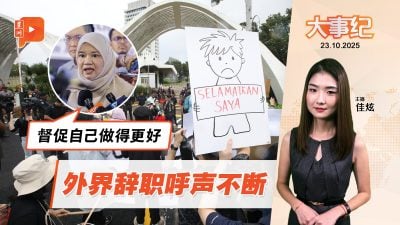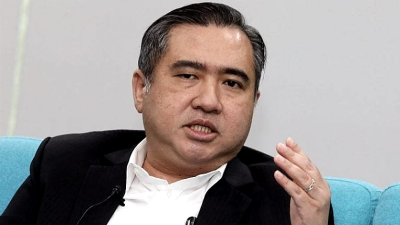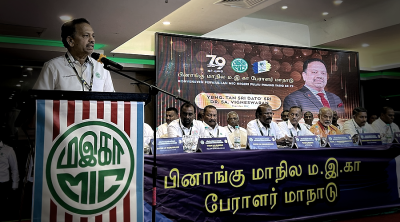
On January 17, Research for Social Advancement (REFSA), a think-tank in Kuala Lumpur, and the Research Center for Malaysia at Huaqiao University jointly hosted a closed-door roundtable titled “Prospects of Malaysia-China Relations in the Post-Pandemic Era.”
The dialogue explored Malaysia-China relations amid the shaping of a new geopolitical order post-pandemic, and deliberated on strategies to move forward the bilateral relationship.
This roundtable is especially significant as 2023 marks the 10th anniversary of the Malaysia-China comprehensive strategic partnership, while 2024 will mark the 50th anniversary of diplomatic relations between the two countries.
The roundtable brought together a diverse group of policymakers, academics and thought leaders from Malaysia and China, including Associate Professor Zhong DaRong, Research Center for Malaysia, Huaqiao University; YB Liew Chin Tong, Deputy Minister of International Trade and Industry (MITI); YB Ong Kian Ming, former MITI deputy minister; Dr. Ngeow Chow Bing, Director, Institute of Chinese Studies, Universiti Malaya; Dr. Phoon Wing Keong, Academic Director of Center for Malaysian Chinese Studies; Datuk Tan Yew Sing, Honorary President of Malaysia-China Chamber of Commerce and Joint Chairman of Tan Kah Kee Foundation; and Mr. Yong Kai Ping, CEO of Selangor Information Technology & Digital Economy Corporation (SIDEC).
With Tan E Hun, Executive Director, REFSA as chairman, the roundtable was also attended by academicians from China, notably Dr. Liu WenZheng, Associate Professor of School of International Relations, Huaqiao University, and Professor Zhai Kun, Professor of School of International Studies, Peking University.
The participants concurred that in the current post-pandemic era, Malaysia and China are separately going through national resets that are redefining their positions globally and in the Asian region.
The recent 20th National Congress of the Communist Party of China, and the formation of a unity government in Malaysia led by Prime Minister Datuk Seri Anwar Ibrahim, provided a soft reset of the diplomatic relations between the two countries, with both working towards strengthening their domestic stability and relationship with neighboring countries.
To that extent, with the right commitment and openness to engage constructively, China-Malaysia relations have the potential to grow from strength to strength.
The following key prongs were deliberated during the roundtable:
Building an inclusive, regional order in Southeast Asia
Amidst the ongoing Ukraine war and normalization of US-China competitive relations, Asean can play an important role as an immediate and connecting force that emphasizes inclusivity and regional cooperation.
Participants felt that the future development of Asean and Asia-Pacific could offer opportunities for deeper exchanges with other regions, an important part of China’s own diplomatic efforts.
Most Southeast Asian countries are heavily dependent on China economically; however they remain cautious of China’s stance on security matters in the region.
Building long-term trust is critical to fostering a mutually beneficial relationship.
On the other hand, there is great need for Southeast Asian countries such as Malaysia to continue developing a deeper understanding of China.
Domestic developments outlining the Malaysia-China diplomacy framework
China, in concluding its recent Chinese Communist Party’s elections alongside the country’s re-opening, has emphasized its commitment to re-establish and strengthen their communications with other neighboring countries in a more pragmatic, open, confident and equal manner.
Malaysia, meanwhile, has shown great resilience, having gone through some tumultuous political struggle in recent years.
Prime Minister Anwar Ibrahim’s focus is currently centered on strengthening local governance; however he maintains a broad international vision and, through his continuing engagements with China, signals the importance of these bilateral relations.
If both countries can deepen their engagements and cooperation, bilateral economic and diplomatic efforts will benefit from new progress and development.
Unresolved regional tensions highlighted the fragility of the Malaysia-China relationship
The two country’s geographical proximity is both an advantage and a source of contention.
China’s proximity to Southeast Asia, as well as its growing economic and diplomatic influence as a country with a large economy, may also create a sense of apprehension or wariness among Southeast Asian countries, especially when concerned with security matters.
Countries such as Malaysia do not seek to pick sides in the midst of global superpower struggles, instead seek to develop their own independent foreign policy.
Mutual understanding must be established in order for all parties involved to benefit from ongoing scenarios, where China has to take into consideration Southeast Asia’s security concerns, and Southeast Asia should develop a deeper understanding of China’s vision.
Re-opening of China’s border contributes to a robust economic outlook for Malaysia
Chinese investment in Malaysia has been greatly affected during the COVID-19 pandemic.
With restrictions now lifted in China, a more favorable economic and trade outlook for both countries is expected in 2023 where more Chinese companies can explore the opportunity to expand their businesses in Malaysia.
At the same time, the presence of large manufacturing companies in Malaysia enables the country to be part of the global supply-chain, thus developing Malaysia domestically.
Beyond this, there is great potential for cooperation between Malaysia and China in areas such as artificial intelligence, big data, e-commerce and smart cities.
In this post-pandemic era, as Chinese tourists gradually go abroad, Malaysia, as an important tourist destination favored by Chinese tourists, can further promote the local tourism industry through measures such as improving tourism services and facilitating visa procedures.
Education and cultural exchange as a commonality between China and Malaysia
Educational exchange between China and Malaysia is long standing and will continue to benefit both countries. Malaysia welcomes exchanges on tertiary programs, vocational/technical training on research and development, which would increase educational and cultural collaboration between the two countries.
Participants also agreed that cultural exchanges will further encourage mutual trust and understanding between the two countries, with specific note to promote such dialogues not just within the Chinese communities in Malaysia.
In conclusion, the roundtable aims to be a catalyst for further deeper exchanges on the various convergence areas that both Malaysia and China are participants of.
Malaysia-China relations are currently at a strategically opportune time for development; more dialogues should be held to seek mutually beneficial ways of enhancing and propelling the already long standing warm relationship between both countries that will ultimately benefit the people of both nations.
ADVERTISEMENT
ADVERTISEMENT








































